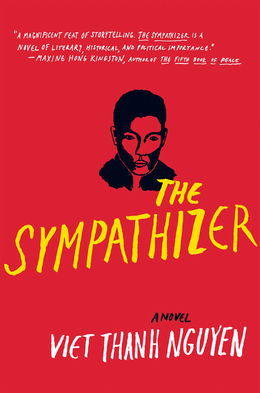Winner of the 2016 Pulitzer Prize for fiction, “The Sympathizer” shocked audiences and critics alike. Viet Thahn Nguyen, professor of English at the University of Southern California, received one of the highest awards in fiction for his very first novel, a novel that follows the Vietnam War and its aftermath.
Coming in at 371 pages, “The Sympathizer” has a first-person narration from the main character, who we only know as “The Captain.” Despite never knowing his name, the reader feels close to him through his intricate internal thoughts and attitudes toward the Vietnam War.
The basic plot (which is anything but basic) starts with The Captain leaving Vietnam with his General after the fall of Saigon. He immigrates to America, assists the General in the political fight to return to Vietnam and tries to understand what it means to be an American. What the reader comes to know is that The Captain is actually a Communist spy working deep undercover, and while in America must commit unimaginable crimes in the name of the political cause he has devoted his life to.
Stylistically, this novel deserves all the praise. It takes an experimental route, slowly becoming familiar, without having quotation marks around dialogue. This choice is done with delicacy in contemporary modern novels like “Gilead,” “Blood Meridian” and “Normal People.” The change in traditional convention puts the reader closer to The Captain and forces a slower read, giving space to appreciate the rich prose.
The prose is so rich that it could buy a social media company, tank it and still emerge wealthy. Nguyen relishes in gorgeous images and intricately crafted details that beg to be read again and again. The shape of a woman’s dress, the heat of a bare lightbulb, the desolation of a bachelor’s fridge stuck with me long after I put the book down.
The plot takes its time unfolding, and although I typically enjoy a fast-paced book, Nguyen timed this novel perfectly. The characters become more and more entrenched with each other over time, and pulsing through the veins of the plot is the haunting question: Where does one’s loyalties lie? The heart of the question beats faster and faster, finally reaching a breaking point in the final act.
It’s no surprise this book won a Pulitzer; vivid scenes can’t be ignored. The proud General’s wife sprints to a helicopter, an innocent man is murdered in a parking garage and the final torture scene is brutal in its refusal to end. Nguyen never backs down from the hard reality of war.
It’s hard to believe this is Nguyen’s first novel; the themes are handled with raw verity and unflinching focus. It certainly feels like the work of a seasoned novelist, and as soon as I finish reeling from its emotional impact, I plan on buying the sequel, “The Committed.”
Oddly enough, I had finished reading a similar work, “Native Speaker” by Chang-Rae Lee, the previous month, and it was impossible to ignore how the novels were in conversation with each other.
“Native Speaker” was published in 1996, the debut novel of Lee, and it won the Hemingway Award for Best First Novel. The plot follows Henry Park, a first generation Korean immigrant as he tries to assimilate into American society. Where the overlap with “The Sympathizer” comes into play is in the fact that Henry Park works as a spy, and his major assignment in “Native Speaker” involves him destabilizing the political career of a man who illegally helps immigrants with a communist-like money sharing system.
Spies, politics and immigration. Though Henry Park and The Captain come from different Asiatic backgrounds, they both work as spies for a living and try to understand America from an outsider’s perspective. I finally made the connection when I came across a list The Captain had made outlining his two different cultural experiences; in “Native Speaker” Henry Park’s wife makes a similar list.
“Native Speaker” was published in 1996, and “The Sympathizer” won the 2016 Pulitzer. Though distinctly different novels, I’d be shocked if Nguyen hadn’t read Lee’s novel and gained inspiration from it. Both have a lot to say about the immigrant experience in America and what it means to have strong political beliefs.
“The Sympathizer” draws on the tradition of the novels that came before it, and remains one of the most stunning debut novels I’ve ever read. Rich in prose, deft in handling, it’s worth both a read and a re-read.








